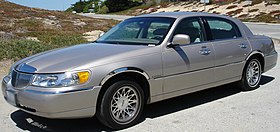Ford Panther platform
| Ford Panther platform | |
|---|---|
 |
|
| Overview | |
| Manufacturer | Ford Motor Company |
| Production | 1978–2011 |
| Assembly | |
| Body and chassis | |
| Class |
Full-size car Full-size luxury car Personal luxury car Limousine |
| Layout | FR layout, body-on-frame |
| Body style(s) | 2-door sedan (1979–1987) 4-door sedan (1979–2012) 5-door station wagon (1979–1991) |
| Vehicles |
Ford models
Mercury models
Lincoln models
|
| Powertrain | |
| Engine(s) | Ford 4.2L Windsor V8 (1981–1982) Ford 5.0L Windsor V8 (1979–1991) Ford 351/5.8L Windsor V8 (1979–1991) Ford 4.6L Modular V8 (1991–2012) |
| Chronology | |
| Predecessor | 1973–1978 Full-size Ford 1970–1979 Lincoln Continental |
| Successor | Ford D3 platform |
The Ford Panther platform is an automobile platform that was used by Ford Motor Company for full-size, rear-wheel drive sedans. Introduced in late 1978 for the 1979 model year, it was progressively updated over 33 years of production.
As of the 2011 model year, the Panther platform was in use longer (32 model years) than any other platform in North American automotive history. It was initially developed as a response to the downsizing of full-size cars from Chrysler and General Motors due to increasingly stringent fuel economy standards for cars. During trying periods for Ford, the Panther cars were scheduled for cancellation and replacement (in favor of the front-wheel drive D186 platform) on several occasions, as early as 1985.
As the 1980s progressed, the full-size cars of the Buick, Oldsmobile, and Pontiac divisions were downsized further; all were replaced by front-wheel drive cars. The Panther's final GM counterparts, the Chevrolet Caprice, Buick Roadmaster and Cadillac Fleetwood were discontinued in 1996. By 1982, Chrysler left the full-size car class completely. In the early 1990s, Chrysler resumed production of FWD full-size cars (the LH platform) and rear-wheel drive (the LX platform) a decade later. However, with the majority of these cars, Chrysler competed against different customers that Ford attracted with the Panther platform.
The Panther platform was produced at Ford's St. Thomas Assembly plant in Talbotville, Ontario, Canada, with the last vehicle rolling off the line 15 September 2011. Prior to its closure on 31 May 2007, the Wixom Assembly Plant in Michigan was the assembly site for the Lincoln Town Car. Assembly of the Town Car was consolidated at the St. Thomas plant in January 2008 following paint shop and other upgrades. Ford and Mercury versions built before the 1986 model year were assembled in the St. Louis Assembly Plant in Missouri; this facility is currently closed. The closure of the St. Thomas plant is also the end of an era for mainstream full-size automobiles using the body-on-frame platform in North America, primarily in the United States and Canada where the rest of the world uses unibody construction.
...
Wikipedia
